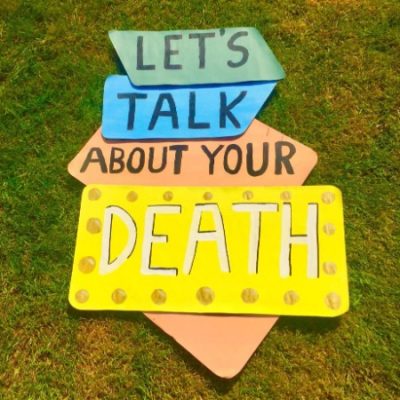FRINGE REVIEWS: 4 plays about DEATH
Posted on August 20, 2018 By Derek Owen Entertainment, Front Slider, Theatre
 British performer Rob Gee was plagued with problems on the opening night of his new Fringe show, Death – A Romantic Comedy (on Stage 5). First there was an unfortunately-timed fire alarm, delaying the opening by precious minutes. He also told us that some git had nicked his pants – so he had to perform in shorts. It’s not presently known if this was part of the schtick, but the delay was real enough, and the show felt a bit rocky until Gee settled in.
British performer Rob Gee was plagued with problems on the opening night of his new Fringe show, Death – A Romantic Comedy (on Stage 5). First there was an unfortunately-timed fire alarm, delaying the opening by precious minutes. He also told us that some git had nicked his pants – so he had to perform in shorts. It’s not presently known if this was part of the schtick, but the delay was real enough, and the show felt a bit rocky until Gee settled in.
The consternation of what had just taken place seemed to add a bit of confusion to Gee’s set of interlinked tales of love, loss, serendipity, blithering drunkenness, funeral parlours, some yob named Bollocks, pranking medical students, world war vets, eccentric elderly Brits (see below), and yes, that big five-letter four-letter word and our theme of the day: DEATH.
There was a lot going on here, as can be easily surmised from all the disparate elements: including a dead Ozzy Osbourne lookalike that offered his opinion on a number of matters; and a body lying on the road that turned out to be Gee’s dead schoolmate.
Gee is a gifted and funny storyteller, but by the 45-minute mark it started to seem like he’d bit off more than he could chew. He was going here, and going there, before traipsing WAY over there, and then heading back over yonder, and as such, many of the elements seemed disconnected. Was this project a bit too ambitious? But then, with a wink and nod, almost as if on some perceptive extrasensory cue, the performer started bringing most of the loose ends around to tie them up into a cohesive tale of love, loss, death, and the problems we can cause ourselves when we go a little bit too hard on the liquor.
Let’s face it: Few world cultures apart from the British have a sense of humour as great as their love of the drink, so naturally Gee was able to toss in some crazy stories about what British folk do when inebriated, so we, all the way over here, could gleefully let them take our attention away from the dour, unavoidable subject of … the dreaded D-word.
Death – A Romantic Comedy certainly had its share of laugh out loud moments, but this new work didn’t quite meet the level of quality of his past Fringe works like Fruitcake or Forget Me Not. Of course this may have been an off night, with the fire alarm delay, and the “missing” pants. But even when Gee is not at his glowing, un-rattled best, his work is still better than most you are going to see at the Fringe.
4 out of 5
***
 Fringe plays just don’t get more inventive, original, courageous and intelligent as Let’s Talk About Your Death (Stage 11)
Fringe plays just don’t get more inventive, original, courageous and intelligent as Let’s Talk About Your Death (Stage 11)
This fabulous play hits most of the targets in the spectrum of comedy – masterfully and inventively flipping between satire, parody, and improv, and in a few segments, all of them at the same time. It also breaks the fourth wall in such original but simple way you’ll wonder why you didn’t think of it yourself.
Dr. Elliot Morris (playwright David Johnston) has invented a machine that tells you how you are going to die, and we’re all attendees at the filming of his new promotional infomercial showing how his glorious invention is going to revolutionize our lives.
Johnston skewers our reliance on “experts.” Like Dr Morris, most of these self serving, delusional schmucks don’t seem to know much beyond a little modern popular psychology and its endless pursuit of silly fad therapies, countless sham books that are little more than endless rewrites of themselves, the artificiality of modern television, and the evils that marketing executives do in order to hock their wares that do little but sell false hope to the gullible and pad said “experts'” pocketbooks. But then the actor pulls as surprising a U-turn as you can imagine, and promptly pins the pedal to floor, sending this theatrical juggernaut careening wildly in the opposite direction.
It’s all been planned out beforehand, of course, but that’s as accurate a summary as you’re going to get. To provide a quick hint: it goes places and does things that Golden Girls couldn’t and wouldn’t do. Not only does it move in a meaningful direction, it’s beyond witty, and is laugh-out-loud funny in way too many places.
5 out of 5
***
 If you never thought a play about an eccentric, dreadfully boring upper-class elderly British woman could be funny – you may be right. And possibly not British.
If you never thought a play about an eccentric, dreadfully boring upper-class elderly British woman could be funny – you may be right. And possibly not British.
It was difficult to determine what exactly was funny about Stories of Love, Death and a Rabbit (Stage 9), and the character’s endless digressions into the minutiae of her life. It went a bit like this: She’s dressed like Margaret Thatcher … that’s not funny, unless you hated the old dragon queen. And she tries to play some jazz classics for the audience, but ends up playing gangsta rap instead. What’s funny about this?
Ultimately, the answer was found. Unless you are British yourself, a Colonial of recent British descent and/or had an unbalanced British auntie born between 1900 and 1930 that you have fond memories of as a child and found being a captive audience to her strange, stream-of-consciousness ramblings of endless meaningless nonsense was rather endearing in some twisted way, there a miniscule chance you could find any of this play funny.
British performers take a big risk assuming North American audiences are going to get their cultural humour. Here, as an added FYI bonus, there’s virtually no connection to love or death worth speaking about, and only a couple passing references to bunnies.
3 out of 5 – if you’re British
1 out of 5 – everyone else
***
 Pop goes the Opera’s Y2K Death Oratorio (Stage 16) is a cracking, lively musical comedy that goes out of its way to take a serious subject – the performance of a very dark, edgy and serious musical composition – and spin it around until we see the humour, as well as ourselves, in the entire escapade.
Pop goes the Opera’s Y2K Death Oratorio (Stage 16) is a cracking, lively musical comedy that goes out of its way to take a serious subject – the performance of a very dark, edgy and serious musical composition – and spin it around until we see the humour, as well as ourselves, in the entire escapade.
A choir is set to perform an operatic piece composed by a local man named “Arnie.” It is a bleak, scathing critique with a cultural trope for a theme: the destruction that the omnipresence of modern technology quietly wreaks on our lives. Ugh. Even after it’s pointed out that Arnie spends his entire work day in front of a computer, no matter: this is an important, meaningful work meant to be taken seriously by everyone. Big problems arise when Arnie concludes that no one around him seems up to the challenge of “properly” performing his meaty composition. His dark “masterpiece” is adeptly used as a comic foil via thoughtful puns, elements of farce and playful satire.
“Torment, give me torment!” Arnie shouts to his charges with an outlandish aplomb – as if having to sing it wasn’t enough. It becomes clear that Arnie is taking himself a bit too seriously, and the difficulty isn’t just with him. The choir director, a mousy and affable lickspittle named Lillian, doesn’t seem to have the courage to tell Arnie that his composition, well … it sucks.
The choir is made up of characters like airhead artiste Martha-Jane, the resident Maureen Forrester wannabe minus the talent; and Keith, a ne’er-do-well local yokel whose primary skill is singing single-syllable onomatopoeias in a manner of humourously effervescent overkill.
The play is a consistently funny, witty and intelligent piece that while skewering the outlandishness of the characters via their universality, explores age old questions: Like what constitutes good art, and, what is the purpose of art – to entertain, or to enlighten and elevate the human spirit?
Their conclusion to the conundrum is an understandable one given the location of the play (the main sanctuary of the Holy Trinity Anglican Church), and while a smidgen on the maudlin side, they only had an hour to explore questions that have been debated since Cro Magnon began their crude scrawls upon cave walls. Not everyone is going to think what you’ve done is worthwhile, and certainly not everyone is going to get the point either.
Y2K Death Oratorio is one of the higher quality shows at the Fringe this year. Not only is it well written, bubbling over with engaging characters who are not so-over-the-top in their idiosyncrasies as to be unsympathetic, there is some seriously funny back-and-forth bantering here – and all while performing a mock operetta. It’s an excellent satire of their chosen art form.
5 out of 5













